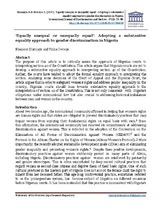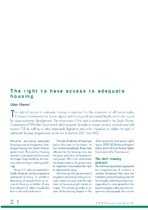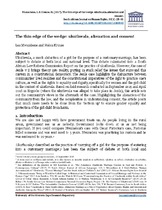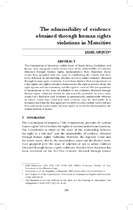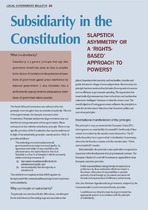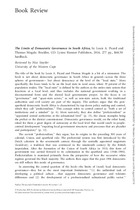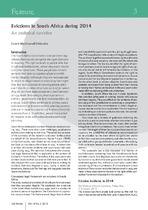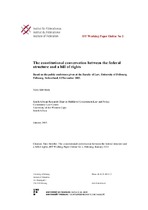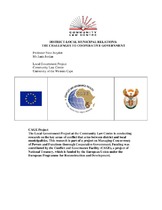Search
Now showing items 1-10 of 38
‘Equally unequal or unequally equal’: Adopting a substantive equality approach to gender discrimination in Nigeria
(SAGE Publications, 2017)
The purpose of this article is to critically assess the approach of Nigerian courts to interpreting section 42 of the Constitution. This article argues that Nigerian courts are yet to develop a substantive equality approach ...
The right to have access to adequate housing
(ESR Review : Economic and Social Rights in South Africa, 2007)
T he right of access to adequate housing is important for the enjoyment of all human rights. A house is fundamental for human dignity and for physical and mental health, which are crucial for socio-economic development. ...
The thin edge of the wedge: ukuthwala, alienation and consent
(Taylor & Francis, 2017)
Ukuthwala, a mock abduction of a girl for the purpose of a customary marriage, has been subject to debate at both local and national level. This debate culminated into a South African Law Reform Commission Report on the ...
The admissibility of evidence obtained through human rights violations in Mauritius
(Juta Law Publishing, 2018)
The Constitution of Mauritius, unlike those of South Africa, Zimbabwe and
Kenya, does not guide courts on the issue of the admissibility of evidence
obtained through human rights. Jurisprudence from Mauritius shows
courts ...
Subsidiarity in the Constitution slapstick asymmetry or a 'rights based' approach to powers
(Community Law Centre, University of the Western Cape, 2008)
What is subsidiarity? Subsidiarity is a general principle that says that governance should take place as close as possible to the citizens. It translates into the protection of lower levels of government against undue ...
The limits of democratic governance in South Africa, by Louis A. Picard and Thomas Mogale
(Oxford University Press, 2015)
The title of the book by Louis A. Picard and Thomas Mogale is a bit of a misnomer. The book is not about democratic governance in South Africa in general—across the three spheres of government— but about democracy at the ...
Litigating socio-economic rights through amicus briefs Challenges and strategies
(ESR Review : Economic and Social Rights in South Africa, 2009)
The Constitution of South Africa (the Constitution) is characterised by its extensive commitment to socio-economic rights. The courts are mandated to translate these rights into enforceable legal claims, primarily by ...
Evictions in South Africa during 2014: An analytical narrative
(ESR Review : Economic and Social Rights in South Africa, 2015)
The South Africa Constitution and pertinent legislative frameworks recognise the right of access to housing. This right extends to people who live in informal settlements, where they erect shacks and other structures. These ...
The constitutional conversation between the federal structure and a bill of rights
(Community Law Centre, University of the Western Cape, 2015-01)
It is often assumed that a constitution speaks with one voice and that all parts are in harmony with each other. Although different provisions can be given higher status than others (as reflected in the more arduous amendment ...
District-local municipal relations: The challenges to cooperative government
(Community Law Centre, University of the Western Cape, 2005)
Outside of metropolitan areas, local government is shared by district and local municipalities; the 47 district municipalities and 231 local municipalities share legislative and administrative powers over the same geographical ...

